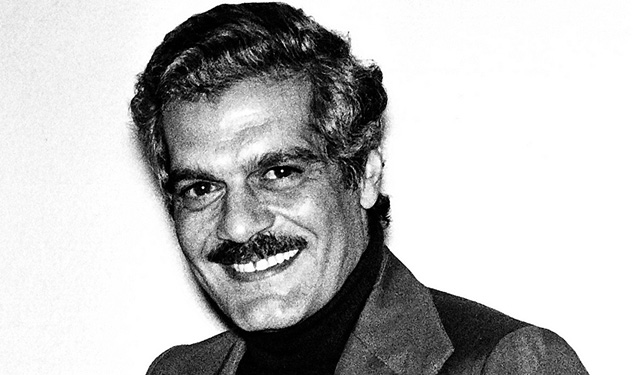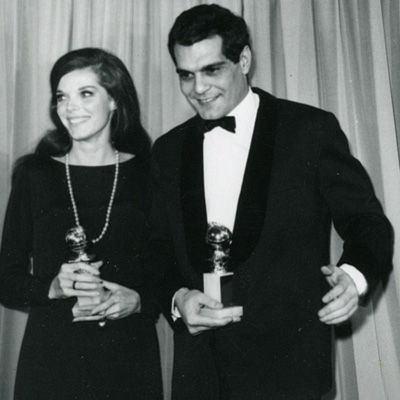
- Industry
Omar Sharif 1932-2015
Omar Sharif, three time Golden Globe winner, an Egyptian-born international star, has died in Cairo, age 83.
The only Egyptian actor to have achieved Hollywood stardom, Sharif emerged as a star very much like the way his character in Lawrence of Arabia emerges on the screen, in a classic shot devised by triple Golden Globe winner director David Lean, and photographed by ace British cinematographer, Golden Globe winner Fred Young: In what is perhaps one of the most dramatic entrances recorded on film, Sharif plays an Arab tribal chief, who join Peter O’Toole’s Lawrence of Arabia in his fight against the Turkish army.
He appears almost like a desert storm – a small point on the horizon that grows as it approaches the camera, in a daring, steady framed and long held shot. From the desert haze the distant dot grows into a camel rider, approaching the waiting Lawrence. All clad in black, Sharif stops in front of O’Toole, whips the black cloth covering his head, to reveal the handsome, masculine face that won him the role: Never seen before in the west, Sharif had appeared in a number of Egyptian films until British director Lean cast him in his 1962 epic.
His movie career in Egypt was not Sharif’s first choice. Born on April 10, 1932 as Michel Demitri Chalhoub to a well to do family in Alexandria, he graduated Cairo University
with a degree in physics and math, and for a few years worked in his father’s precious
wood business.
In his twenties he decided to capitalize on his good looks and language skills, and went to London to study at the Royal Academy of Dramatic Arts. As he returned and started acting in Egyptian movies, taking on the name Omar el-Sherif quickly becoming a heart throb, cementing his local fame by co-starring with Egypt’s most popular actress, Faten Hamama, whom he married in 1955 having converted from Catholicism to Islam.
Lawrence of Arabia dominated the 1963 Golden Globes, with nine nominations and six wins. Sharif collected two statuettes: He shared the New Star title (a category later dropped from the Awards) with Peter O’Toole. But while Sharif, Anthony Quinn (supporting) and O’Toole (lead) were all nominated in the acting categories, only he won. [The other winners were the director Lean, cinematographer Young, in another category dropped later] and producer Sam Spiegel who won the Golden Globe for Best Motion Picture- Drama.
Unlike other foreign actors who succeed in Hollywood, but only too often are cast again and again in the same ethnic role. Sharif was given the most astonishingly wide range: He was seen next as an Armenian king in The Fall of the Roman Empire (1964), as a Spanish priest in the Spanish Civil War drama Behold a Pale Horse (1964), as a Yugoslav partisan fighting the Nazis in The Yellow Rolls-Royce (1965), and as a Mongol conqueror in Genghis Khan (1965).
In his next movie, Doctor Zhivago (1965), Sharif won his third Golden Globe playing the role of a Russian medical doctor-poet caught physically and emotionally in the turmoil of war.
There would be other diverse roles: A German officer in The Night of the Generals (1967), again teamed with O’Toole, and perhaps in the biggest stretch as the adorable American-Jewish gambler and ne’er do well Nicky Arenstein, opposite newcomer Barbra Streisand in her debut movie, Funny Girl (1968), as Ziegfeld Follies star Fanny Brice, who falls in love and marries Arenstein, the irresistible Sharif. Filmed a the time of the Six Day War between Egypt and Israel, the film generated some controversy around the kisses between Arab Sharif and Jewish Streisand, the actor recollected in a 2003 HFPA interview, adding that he “never asked the women he kissed about their nationality or religion”.
His next role was as revolutionary hero Ernesto (Che) Guevara in the failed movie Che (1969). A great number of movies, many of them forgettable, followed, but Doctor Zhivago was arguably Sharif’s career high point. Another Golden Globes favorite, in 1966, Doctor Zhivago garnered six nominations and five wins: Best Motion Picture, Drama, for producer Carlo Ponti, another directing Globe for Mr. Lean, original script for triple Golden Globes winner Robert Bolt, and an original score for Maurice Jarre (nominated but did not win for his Lawrence score, but a four times Golden Globes winner).
With the end of the sixties, Sharif’s brand of international charm lost its commercial appeal. He recognized it, telling the New York Times, philosophically: “… I had it good and bad, :.. I did three films [within five years] that are classics, which is very rare in itself,” But, he said, the end of the 1960s brought a cultural revolution: …“There was a rise of young, talented directors … making films about their own societies. There was no more room for a foreigner, so suddenly there were no more parts [for me] “. “I decided,” he told The Times in 2003, “that I wanted to keep some dignity in my old age … My philosophy of life is that I’m living every moment intensely, as if it were the last moment,” he said. “I don’t think of what I did before or what I’m going to do. I think of what I’m doing right now.”
His last and most recent movie was the French family drama Rock the Casbah (2013). But more of Sharif’s time was devoted to his other career and love – gambling and playing bridge. The latter brought him international fame as he played competitively, was captain of the Egyptian Bridge Team, wrote a syndicated bridge column and a number of books on the subject, including Omar Sharif’s Life in Bridge (1983). It was the title of another of his books, His autobiography, that captured the essence of this charming and talented star:
The Eternal Male.
1966 Omar Sharif and Samantha Egger receive Golden Globes

